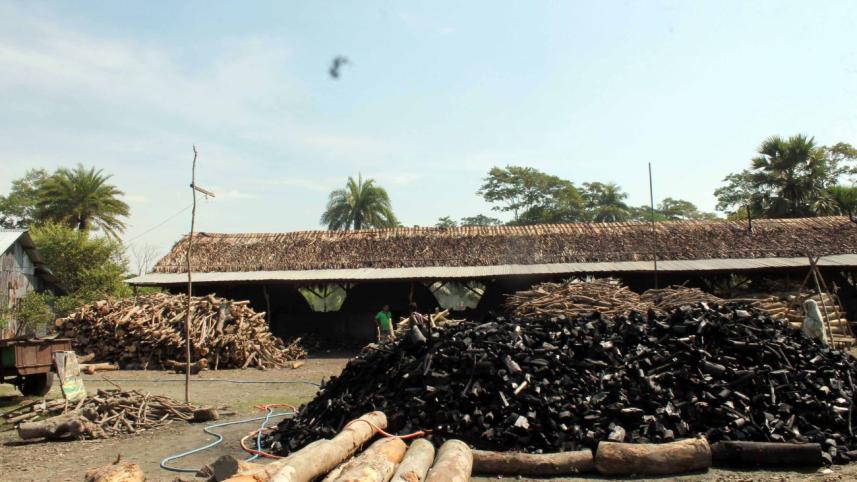Charcoal plant on waqf land

After illegally occupying a 1.57 acre plot of land donated under Islamic law for charitable purpose, known as a waqf estate, a Jubo League leader in Kalaiya village of Patuakhali's Baufal upazila has been operating an illegal charcoal plant on the site, resulting in significant pollution, it is alleged.
Md Mizan Mollah is the organising secretary of Jubo League's Kalaiya union unit. He established the charcoal plant south of Kalaiya bazar in November 2015, and according to worker Anwar Hossain, the six fireplaces can burn up to 300 maunds of local timber at a time. Each fireplace can produce 70 maunds of charcoal every seven to ten days, the worker says.
"I leased the land from Shahjada Mia, the waqf estate's custodian," says Mollah. "I have not taken permission for setting up the charcoal plant as the environment will not be polluted and it will not bring about any threat to health or the environment."
"It is illegal to produce charcoal from firewood," says Md. Nazrul Islam, Barisal's divisional director of the environment department. "We didn't issue any permission to set up a charcoal plant."
Moreover, sources at the Patuakhali waqf estate administrator's office said that there is no custodian, named Shahjada Mia, as claimed by Mollah. The legal managers of the estate where his charcoal plant is located are Md Jahangir Hossain and Solaiman Mia, according to the office.
One of the legal custodians, Md Jahangir Hossain, says permission should be taken from the waqf administrators to lease the land, "and we did not lease that land to anybody. Jubo League leader Mizan Mollah set up the charcoal plant after forcibly occupying the waqf property."
Locals report that nobody has protested against the charcoal facility, nor have any steps been taken by the administration to remove it, because Mollah is a politically influential man.
In the meantime smoke and ash pollution is affecting the area, with Ali Akbar Government Primary School just fifty metres from the site, both Kalaiya High School and Kalaiya Rabbania Fazil Madrasa are one hundred metres distant, while Idris Mia Degree College is a further fifty metres away. The charcoal plant also badly affects cropland productivity and has led to deforestation in the area, several of the college teachers say.
Medical officer at Bauful upazila health complex Dr ASM Sayem notes that public health will suffer both short and long term consequences from the air pollution. "Local residents have to live with the threat of various respiratory diseases, and in particular children and expectant mothers can be badly affected," he says.
In the meantime, the charcoal, made from illegally collected local firewood, is reportedly sold to various industries in Faridpur district and to local brick kilns. Charcoal is a fuel that has a huge local demand during the active brickfield season which runs from December to April, sources say.
According to Barisal's divisional coordinator for the Bangladesh Environment Lawyers' Association, Lincon Bayen, the legal position in such circumstances is clear. "It is illegal to produce charcoal by burning firewood," he says, "and the administration including the Department of Environment (DoE) can take legal steps to stop the charcoal operation."
It is curious as to why no action has been taken thus far.
"We will take immediate steps to stop the operation as it is a threat to public health and the environment," the DoE's Md Nazrul Islam says.

 For all latest news, follow The Daily Star's Google News channel.
For all latest news, follow The Daily Star's Google News channel.